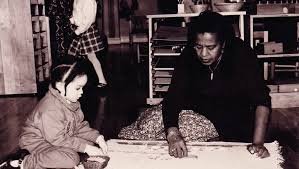Hidden Black Voices in the History of Montessori Education
Montessori education is often associated with names like Maria Montessori and Alexander Graham Bell, pioneers whose contributions shaped its philosophy and practices. However, amidst the spotlight on these figures lies a tapestry of lesser-known yet equally significant voices, particularly those of Black educators who championed the Montessori method in marginalised communities.
In the annals of educational history, the narrative often revolves around celebrated figures, eclipsing the stories of individuals whose impact might have been profound but remains obscured by the passage of time. It's in this historical blind spot that we find Mae Arlene Gadpaille, Roslyn Williams, and Lenore Gertrude Briggs—three Black Montessori educators whose commitment to social justice through education echoes the ethos of Maria Montessori herself.
Rediscovering Mae Arlene Gadpaille
Mae Arlene Gadpaille, a beacon of resilience and determination, defied societal norms to pave the way for Montessori education in under-served communities. Born in 1905, Gadpaille's journey mirrored the struggles of her era, marked by racial segregation and limited opportunities for Black Americans. Despite these barriers, she founded the Montessori Family Center in Boston, offering a haven for children to thrive regardless of their background.
Championing Educational Equity: Roslyn Williams
Roslyn Williams emerged as a trailblazer in the realm of Montessori education, advocating for inclusivity and equity in a landscape fraught with discrimination. In 1976, Williams articulated the essence of the Montessori learning structure, emphasising its potential to empower children from all walks of life. Her work resonated beyond the confines of classrooms, sparking a movement towards educational reform grounded in social justice principles.
A Legacy of Empowerment: Lenore Gertrude Briggs
Lenore Gertrude Briggs, a luminary in her own right, left an indelible mark on the landscape of Montessori education. Through her tireless efforts, Briggs elevated the voices of marginalised communities, recognising the transformative power of education as a catalyst for change. Her legacy continues to inspire a new generation of educators committed to fostering inclusive learning environments rooted in compassion and understanding.
Amplifying Voices, Enriching Narratives
The stories of Mae Arlene Gadpaille, Roslyn Williams, and Lenore Gertrude Briggs serve as a poignant reminder of the diverse tapestry of voices woven into the fabric of Montessori education and the overlooked contributions of Black educators in the history of Montessori education, highlighting their enduring legacy and the enduring relevance of their work in today's educational landscape. Their tireless advocacy and unwavering dedication to social justice embodies the core principles espoused by Maria Montessori, transcending barriers of race, class, and privilege.





